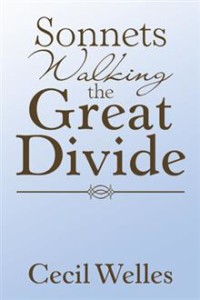Title: Sonnets Walking the Great Divide
Author: Cecil Welles
Publisher: AuthorhouseUK
ISBN: 9781524678012
Pages: 114
Genre: Poetry
Reviewed by: Dan MacIntosh
Buy on Amazon
Pacific Book Review Star
Awarded to Books of Excellent Merit

Poet Cecil Welles is a mathematician by day, but you’d likely never guess this fact from reading his collection, Sonnets Walking the Great Divide. Welles wrote many of these poems to bring himself just a little thought clarification. In our modern times, we all can use a whole lot more clarity.
Sonnets are 14 lines of poetry, and Welles has filled this 100 plus page work with much literary variety. While many of these works are deeply philosophical, one clear favorite is simply titled “John.” “John,” it’s assumed, is dedicated to the famous – and recently deceased — pilot and astronaut John Glenn. With its kind words, Welles appears to compare life after death with the perfect flight. “I know, dearest friend, you found a peace/That pilots know when wafted, ascending,” he writes. Perfection is particularly alluded to when Welles pens, “No drag dare inhibit this closing journey.” Welles ends by writing, “A requiem for pilots is the vow/To find their final peace above the clouds.” It is right here where, perhaps, Welles is best able to combine his military work experience with his poetic muse.
Another fascinating work is called “Backwards.” Once again, the reader is left to figure out Welles’ subject matter from the tasty breadcrumb clues he leaves along the trail. Could this one concern The King and The King of Pop, as it begins with the line, “Elvis and Michael are worshipped, not praised”? He later writes, “Human bling with shrines to immortalize,” and it gives one secret glee just to see the word “bling” used in poetry. But it’s unexpectedly here, and in this instance, fits perfectly.
There’s one more word usage that particularly stands out. The last line of “Blessed” reads: “These oxymora in our land of bounty.” It gives the heart a certain glee to read a sonnet that ends with the word “oxymora’ in its final line. (This reader has never read that conjugation of the word, nor has he heard it in conversation). However, it’s a reminder that this is a wonderful plural to add to the old vocabulary.
Fine poetry, such as the variety Welles has filled out in his new collection with, is refreshing to read. With the advent of social media, where seemingly everybody is a writer now, with an inflated opinion of his or her writing skills, readers can become demoralized – and fast. For example, a person can simply go crazy merely playing ‘count the grammatical errors,’ alone. Welles collection is the work of one who has taken the time to think, and think deeply about what he writes. Clarification doesn’t come from sloppily spilling one’s thoughts on a page (or a status update, for that matter). By contemplating just the right words to complete a thought or conjure up a solution to a problematic consideration, images begin to come into better focus. Unlike his mathematical side, though, Welles can think artfully, as well as intellectually, with these sonnets.
Welles also expresses a lighter side of his literary personality, one he calls “Rug-Rats,” appears to concern the entertaining physical play of young children. They’re described as “Two powder kegs, taut catapults, projectile,” which puts these child activities in militaristic terms. It all becomes much more lighthearted, however, when he writes, “Of what follows, tough chipmunk laughter gleams.” One can just picture a living room with young children having the time of their lives. Innocence is fleeting, and must be recognized immediately and treasured greatly before time steals it forever.
There is much to digest with Sonnets Walking the Great Divide, but it’s also one healthy and satisfying meal.



Follow Us